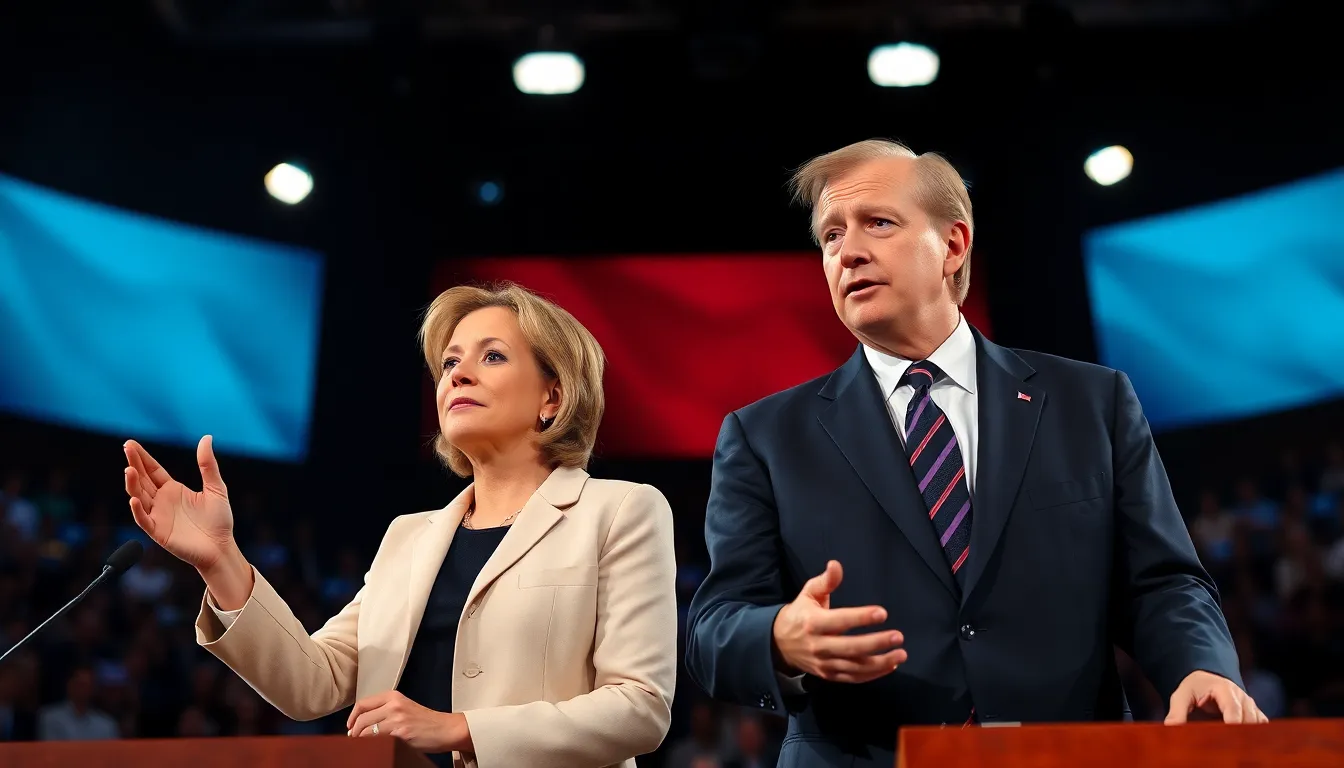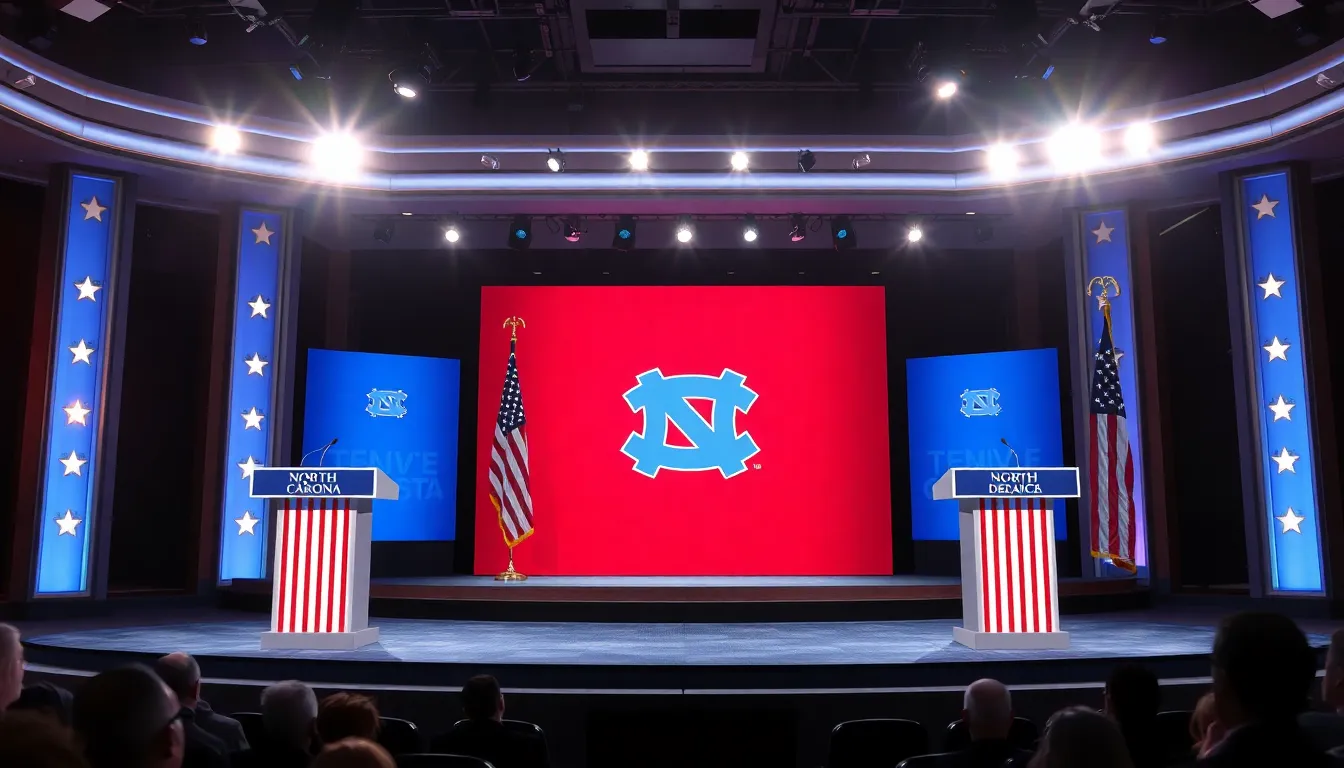As the election season heats up, the vice presidential debate emerges as a pivotal moment for candidates and voters alike. This event offers a unique opportunity to gauge the candidates’ positions and personalities, often shaping public perception in crucial ways. With the stakes high, audiences eagerly anticipate the clash of ideas and rhetoric.
Marking a key date on the campaign calendar, the vice president debate not only highlights the running mates but also provides insight into the presidential candidates they support. Understanding when this debate takes place can help voters stay informed and engaged in the electoral process. As the date approaches, discussions around the candidates’ qualifications and policies will intensify, making this debate a must-watch for anyone invested in the future of the nation.
Table of Contents
ToggleOverview of Vice President Debates
Vice president debates play a critical role in the U.S. electoral process. These events provide candidates with a platform to discuss policy issues, outline their visions, and address the concerns of voters. Typically held a few weeks before the election, vice presidential debates occur during prime time, allowing for maximum public viewership.
Candidates often focus on their counterparts, drawing contrasts on key issues. They showcase their political experience and qualifications while responding to tough questions from moderators. Analyzing past debates reveals that candidates can significantly influence voter perceptions and gather momentum heading into the final stretch of the election.
The format generally includes opening statements, a series of questions, and closing remarks. Each candidate gets equal time to articulate their stance, ensuring a fair and balanced discussion. These debates frequently serve as a turning point for undecided voters, as they seek clarity on the candidates’ positions.
Historical data indicates that vice presidential debates attract millions of viewers, reinforcing their importance in the electoral landscape. They act as a litmus test for the candidates’ ability to connect with the public and express their policies clearly. Engaging performances can elevate a candidate’s profile, making them a vital component of any campaign strategy.
History of Vice President Debates

Vice presidential debates have evolved significantly since their inception. These events offer insights into the political landscape while informing voters about candidate positions.
Notable Vice President Debates in History
- 1960 Nixon vs. Lodge: This debate marked the first televised vice presidential debate. Richard Nixon’s performance set a precedent for visual presentation in politics.
- 1984 Mondale vs. Reagan: Geraldine Ferraro’s candidacy as the first female vice presidential nominee made this debate historic. The exchange highlighted issues like women’s rights and economic policy.
- 2004 Cheney vs. Edwards: This debate focused heavily on national security post-9/11. Dick Cheney’s experience contrasted with John Edwards’ youthful energy, framing the electorate’s choice on security perspectives.
- 2008 Biden vs. Palin: Sarah Palin’s unexpected responses sparked nationwide discussions about readiness for office. Joe Biden showcased extensive experience, emphasizing the importance of foreign policy knowledge.
Changes Over the Years
- Increased Media Coverage: Vice presidential debates now receive extensive media analysis, impacting public perception more than in earlier decades.
- Revised Formats: The structure has changed, incorporating town hall segments to engage audience members directly. This shift reflects a desire for more interactive discourse.
- Focus on Critical Issues: Modern debates prioritize pressing topics such as healthcare, climate change, and social justice, reflecting current national concerns.
- Voter Engagement Strategies: Candidates utilize social media and real-time polling during debates to gauge audience reactions immediately, altering debate strategies significantly.
Schedule for Upcoming Vice President Debate
The upcoming vice presidential debate plays a significant role in the electoral process. It provides candidates with the opportunity to present their policies and address critical issues.
Date and Time
The vice presidential debate is scheduled for October 7, 2024. It will commence at 9 PM Eastern Time, maximizing viewership and engagement across diverse audiences.
Location and Format
The debate will take place at the University of North Carolina in Charlotte, North Carolina. The format includes opening statements, direct questions from moderators, and closing remarks. This structured approach allows candidates to articulate their positions clearly while contrasting their views against their opponents.
Importance of Vice President Debates
Vice presidential debates play a crucial role in the electoral process, influencing voter perceptions and highlighting candidate qualifications. As one of the key events in the campaign season, these debates offer platforms for essential discussions on policy issues and voter concerns.
Impact on Elections
Vice presidential debates impact elections by shaping perceptions of candidates. Historically, engaging performances in debates can shift momentum and attract undecided voters. For instance, debates may clarify candidates’ stances on critical issues, helping voters make informed choices. Data reveals that millions tune in, with some analysts noting a potential influence on swing states. Candidates often highlight their political experience while drawing contrasts with their opponents, steering the narrative around key election themes. Such dynamics underscore the debates as vital components of electoral strategy, often affecting overall campaign outcomes.
Voter Engagement
Vice presidential debates enhance voter engagement significantly. These events not only present candidates’ visions but also serve as forums for addressing pressing national issues. The structured format, featuring direct questions and closing remarks, fosters clear communication. Social media amplifies voter interaction, allowing real-time feedback and engagement on critical topics presented during debates. Increased media coverage further extends the discussion beyond the debate stage, encouraging voters to explore candidates’ positions in depth. By spotlighting relevant issues, these debates motivate voter participation, deepening the connection between candidates and the electorate.
The upcoming vice presidential debate on October 7, 2024, promises to be a pivotal moment in the election cycle. As candidates prepare to present their visions and policies, voters will gain crucial insights into their qualifications and positions. This debate will not only shape public perception but also engage undecided voters who play a vital role in the electoral process.
With millions expected to tune in, the candidates have a unique opportunity to connect with the electorate. Their performances could influence swing states and impact the overall campaign dynamics. As the debate approaches, the anticipation builds, highlighting the importance of this event in guiding voters toward informed decisions.



